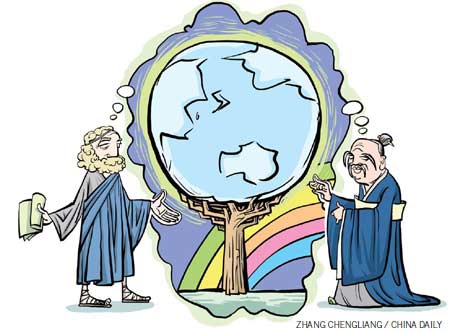Upholding harmony in the land is key to Chinese development
 |
It was telling that Chinese Premier Wen Jiabao opted for culture over politics for the first stop of his recent visit to Britain. Speaking from the birthplace of William Shakespeare, he told of how literature and culture could act as a bridge between nations and implicitly chided leaders that sit at the negotiating table with little understanding of the history and culture of countries they are dealing with.
China and Europe have a lengthy history of miscommunication. If this gap of understanding is to be narrowed, European politicians and people must recognize how Chinese thought differs from the beliefs that are taken for granted in the West. Europe cannot seek to comprehend China without understanding China's past and its philosophical influence on Chinese psychology.
The exploration of just how far China and Europe are from "getting" each other has been carried out to great effect by two young Chinese artists known as "The Utopian Team". Utopia is Back was the title of an exhibition launched in Beijing by He Hai and Deng Dafei. It charted the artists' experiences during a three-month stay in Scotland and the birthplace of James Legge, one of Europe's first recognized sinologists.
Both He and Deng are members of China's Generation X: children born in the mid-1970s who grew up during Deng Xiaoping's era of reforms and witnessed the transformation of Chinese society into a land of super-sized economic growth and new consumer delights. China's Generation X has emerged as a new group of consumers with fresh visions of what constitutes the ideal society in the 21st century - the modern utopia.
The work of the Utopian Team serves as a useful case study for exploring how the concept of utopia is ingrained in the Chinese psyche and the collective memory from the past. By presenting the Chinese ideology of utopia to Europe, the artists reveal much about how the Chinese think and show that the contemporary Chinese vision of utopia derives from ancient ideals such as the Confucian search for harmony.
Utopia may be a Western concept that stems from a pun on the Greek words for "nowhere place" and "happy place". It denotes an ideal society in Thomas More's 16th-century book Utopia (1516), but the concept has a Chinese equivalent with roots in traditional Chinese culture.
China has been the land of many utopian visions from ancient to modern times and the search for utopia in China has spilt much ink and blood. The Confucian utopia of the Great Sharing (da tong) stems from the ancient Confucian classic The Book of Rites.
The idea of the realm of Supreme Harmony (tai ping) goes back to the ancient Taoist philosopher Zhuangzi (369-286 BC) who lived during the Warring States period (403-221 BC) before the first unification of China in 221 BC.
Another vision of utopia, the land of Huaxu, is a realm of perfect order and prosperity that China's legendary Yellow Emperor, the founder of Chinese civilization, was said to have reached in a dream; he subsequently strove to govern his empire on its model.
There have been many more visions of utopia throughout the centuries, from the Taiping rebels in the 1860s to the founding father of Republican China Sun Yat-sen, and the leader of New China Mao Zedong.
What binds together Chinese visions of utopia is the importance of upholding harmony in the land, an ideal that occupies center stage in Chinese President Hu Jintao's contemporary political doctrine of the "harmonious society".
Harmony is based on the ancient Chinese concept of zhong yong, the "Doctrine of the Mean", as expounded in the eponymous Confucian classic. Zhong yong, also translated as "midway thinking", advocates moderation and modesty with the aim of creating harmony in interpersonal relationships. It is the Chinese way of solving social conflicts.
According to China's current leaders, a harmonious society puts people first. The People's Daily newspaper in China describes "harmonious society" as a scientific concept of development to help solve contradictions and conflicts in China's transformation period while maintaining social harmony, progress and stability.